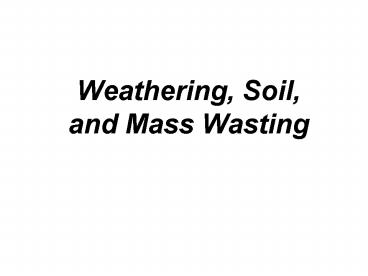Weathering, Soil, and Mass Wasting - PowerPoint PPT Presentation
1 / 26
Title:
Weathering, Soil, and Mass Wasting
Description:
Weathering the disintegration and decomposition of material at or near ... Unloading and exfoliation. of igneous rocks. Weathering. Two kinds of weathering ... – PowerPoint PPT presentation
Number of Views:738
Avg rating:3.0/5.0
Title: Weathering, Soil, and Mass Wasting
1
Weathering, Soil, and Mass Wasting
2
Earth's external processes
- Weathering the disintegration and decomposition
of material at or near the surface - Mass wasting the transfer of rock material
downslope under the influence of gravity - Erosion the incorporation and transportation of
material by a mobile agent, usually water, wind,
or ice
3
Weathering
- Two kinds of weathering
- Mechanical weathering
- Breaking of rocks into smaller pieces
- Processes of mechanical weathering
- Frost wedging
- Unloading
- Biological activity
4
Frost wedging
5
Unloading and exfoliation of igneous rocks
6
Weathering
- Two kinds of weathering
- Chemical weathering
- Alters the internal structures of minerals by
removing or adding elements - Most important agent is water
- Oxygen dissolved in water oxidizes materials
- Carbon dioxide (CO2) dissolved in water forms
carbonic acid and alters the material
7
Weathering
- Two kinds of weathering
- Chemical weathering
- Weathering of granite
- Weathering of potassium feldspar produces clay
minerals, soluble salt (potassium bicarbonate),
and silica in solution - Quartz remains substantially unaltered
- Weathering of silicate minerals produces
insoluble iron oxides and clay minerals
8
Rates of weathering
- Advanced mechanical weathering aids chemical
weathering by increasing the surface area - Important factors
- Rock characteristics
- Mineral composition and solubility
- Physical features such as joints
9
Increase in surface area by mechanical
weathering
10
Rates of weathering
- Important factors
- Climate
- Temperature and moisture are the most crucial
factors - Chemical weathering is most effective in areas of
warm temperatures and abundant moisture
11
Rates of weathering
- Differential weathering
- Caused by variations in composition
- Creates unusual and spectacular rock formations
and landforms
12
Joint-controlled weathering in igneous rocks
13
Weathering and Making coffee
Fig. 6.4
14
An idealized soil profile
15
A soil profile showing different horizons
16
Soil
- Soil erosion
- Recycling of Earth materials
- Natural rates of erosion depend on
- Soil characteristics
- Climate
- Slope
- Type of vegetation
17
Soil
- Soil erosion
- Soil erosion and sedimentation can cause
- Reservoirs to fill with sediment
- Contamination by pesticides and fertilizers
18
Mass Wasting
- The downslope movement of rock, regolith, and
soil under the direct influence of gravity - Gravity is the controlling force
- Important triggering factors
- Saturation of the material with water
- Destroys particle cohesion
- Water adds weight
19
Mass Wasting
- Important triggering factors
- Oversteepening of slopes
- Unconsolidated granular particles assume a stable
slope called the angle of repose - Stable slope angle is different for various
materials - Oversteepened slopes are unstable
- Removal of anchoring vegetation
- Ground vibrations from earthquakes
20
Mass Wasting
- Types of mass wasting processes
- Generally each type is defined by
- The material involved debris, mud, Earth, or
rock - The movement of the material
- Fall (free-fall of pieces)
- Slide (material moves along a well-defined
surface) - Flow (material moves as a viscous fluid)
21
Mass Wasting
- Types of mass wasting processes
- Generally each type is defined by
- The rate of the movement
- Fast
- Slow
- Forms of mass wasting
- Slump
- Rapid movement along a curved surface
- Occur along oversteepened slopes
22
A slump with an earthflow at the base
23
Mass Wasting
- Types of mass wasting processes
- Forms of mass wasting
- Rockslide
- Rapid
- Blocks of bedrock move down a slope
- Debris flow (mudflow)
- Rapid flow of debris with water
- Often confined to channels
- Serious problem in dry areas with heavy rains
- Debris flows composed mostly of volcanic
materials are called lahars
24
Forms of mass wasting
25
Mass Wasting
- Types of mass wasting processes
- Forms of mass wasting
- Earthflow
- Rapid
- Typically occur on hillsides in humid regions
- Water saturates the soil
- Liquefaction - a special type of earthflow
sometimes associated with earthquakes
26
An earthflow on a newly formed slope































